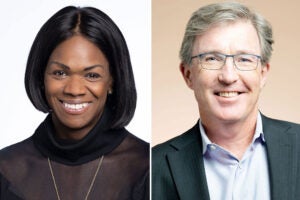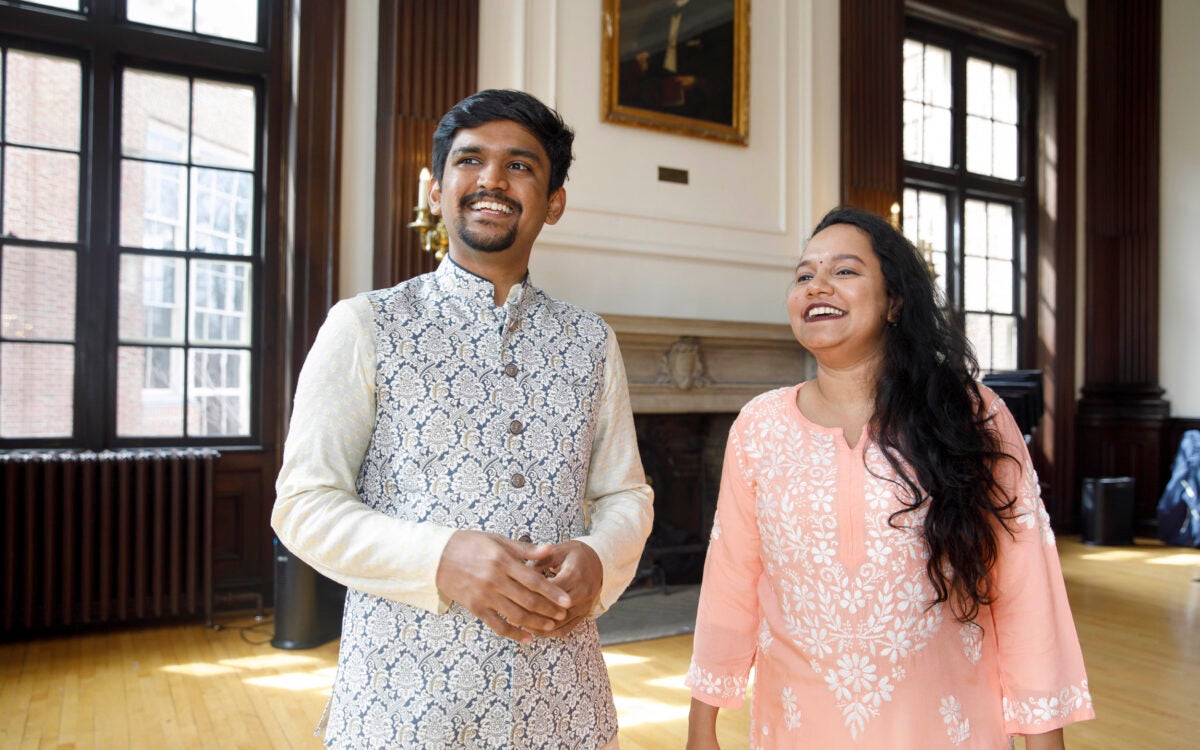‘Elder statesman’ brightens big day
104-year-old alumnus Keene enjoys Commencement 2007
On Thursday afternoon (June 7), in the shade of a tree in the Old Yard, Philip Keene of Natick, Mass., sat in a wheelchair holding a small sign that read “1925.” Nearby was Thayer Hall, where he lived as a senior 82 years ago.
At 104, Keene S.B. ’25, S.M. ’40 was the oldest Harvard graduate to return for Commencement Day — and is the fourth-oldest graduate still living. A 1925 classmate of his, Halford J. Pope, a mere 103, lives in Hilton Head Island, S.C. The two men are the last living members of their Harvard College class, which numbered 589.
How has he managed to live so long? “Just luck,” said Keene, his eyes bright and his hair neatly combed.
Maybe a little more than luck, said David Keene of Wellesley, Mass., who has escorted his father to Commencement Day exercises six years in a row. There was also a hardy life, much of it in the outdoors. (Keene was a practicing civil engineer until the age of 93.)
Add to that a happy marriage, a sense of humor (his family called him “the kidder”), good genes, and a grasp of moderation. “He learned to pace himself, so he didn’t overwork,” said the younger Keene. “He’d take naps on Saturday afternoon.”
Keene was born in Newton, Mass., spent the first 10 years of his boyhood in Cuba (where his peripatetic father was a roads engineer) — and went to three high schools, one each in Massachusetts, Oregon, and Montana. After two years at the University of Montana, Keene spent three years at Harvard, where — “small and strong,” his son said — he played shortstop on the 1924 and 1925 baseball teams.
In the class of 1925, Keene was only one of three concentrators in engineering, and went on to a career as a civil engineer — a soils and foundations expert — in Connecticut. After retiring, he did consulting work — some of it in India, Turkey, and Poland.
To a fanfare of horns, Keene in his wheelchair led the procession of graduates as it wound from the Old Yard, past the statue of John Harvard, and into the New Yard’s Tercentenary Theatre.
Behind him in line was George Brenneman Barner ’29, a retired trial lawyer living in Kennebunk, Maine. At 98, he was the second-oldest Harvard alumnus to attend Thursday’s ceremonies.
“I’ve never missed a Commencement,” said Barner, who retired in 1968. “I went to the last three, when it rained.”
The father of six, walking fast, carried the class sign. He usually sees someone he knows, said Barner, but this year, “there didn’t seem to be anyone.”
He graduated from Boston University Law School in 1934, and studied law at Oxford for two years before opening a Massachusetts practice.
“I hope we see each other next Commencement,” he said cheerfully. “I hope.”
As far back as these graduates go, there are some Harvard graduates still living who represent classes still further back in time. The University’s 10 oldest graduates range in age from a venerable 110 to a babyish 100.
Walter H. Seward J.D. ’24, at 110, is the oldest living Harvard graduate, and the last one living to have been born in the 19th century. (He’s also the seventh-oldest man in the world, according to Guinness World Records.)
Seward, who practiced law until the age of 96, has lived in the same West Orange, N.J., house for 45 years.
Second oldest among the 10 — and the oldest living graduate of Harvard College — is Albert H. Gordon ’23, M.B.A. ’25, LL.D. ’77, who is 105. The Wall Street investor, who until last year went to the office four times a week, still works out every day with a personal trainer in his Manhattan home.
Four of the 10 oldest Harvard graduates are women, representing the Radcliffe College classes of 1924, 1925, and 1926.
Radcliffe’s oldest is 104-year-old Marion Coppelman Epstein ’24 of Boston, a onetime social worker who studied social ethics, economics, and philosophy as an undergraduate. Her 1924 Radcliffe yearbook picture shows a young woman in a stylish shift. The inscription reads, “With mirth and laughter let old wrinkles come.”
Gordon, a lifelong exercise buff who ran freshman track at Harvard, spent his working life as a Wall Street salesman and investor. In 1931, he left a career at Goldman Sachs and with two partners bought and revived the venerable old Boston brokerage firm of Kidder, Peabody & Co. Moving the firm to New York, Gordon worked there for 63 years, helping transform it into a powerhouse of international investing.
“He’s doing OK — his spirits are good,” said John Rousmaniere Gordon ’71 of his father, who first stepped onto campus as a freshman in 1919, the son of a Boston leather merchant.
The elder Gordon — namesake of the Albert H. Gordon Track and Tennis Center, who also sponsors a professorship at the Harvard Business School — was last at Harvard in 2003, marking the 80th anniversary of his graduating class.
Albert Gordon — a nonsmoker who used to pay people to quit cigarettes — has three secrets to his longevity. “One is to never retire,” said John Gordon. “You have to say mentally active and engaged.”
The other two: physical exercise (the elder Gordon ran marathons into his 80s) and sleep — at least nine hours a night. His father “brags about how much sleep he got all along,” said John Gordon. (He’s senior managing director at Deltec Asset Management, the hedge fund his father spun off of Kidder, Peabody in 1985.)
Along the way, Albert Gordon would always quiz friends and acquaintances about how they got their exercise and how much they weighed. “I’m surprised,” said his son, “that he didn’t get punched in the nose.”
Tenacity and physical exercise are secrets to longevity that Gordon shares with 110-year-old Walter Seward, a lifelong hiker who always practiced a stretching routine. He can still nearly flex a knee to his chin, said daughter Marymae Seward Henley of New Jersey — who, fittingly, is a gerontologist.
“He’s doing well — phenomenally well, for 110, though his memory is not what it used to be,” she said. Seward has his own teeth, takes just one medication, reads without glasses, and has only missed six of his Rutgers University undergraduate reunions. (There have been 90; he graduated in 1917.) He eschews caffeine, but likes sweets, and never misses his daily bowl of strawberry ice cream.
Seward might owe his long life, in part, to a pledge he made at the age of 14 to never smoke or drink. He lived in Greenwich Village for part of the Roaring ’20s, when bootleg booze flowed freely, said Henley. “I didn’t think they were roaring,” she remembers Seward saying of the 1920s. “I thought they were preposterous.”
A devotion to hard work also “helped him remain cognitively as fit as possible,” she said of her father. He was still writing wills and doing title searches into his 90s.
Then there was Seward’s late, happy marriage to the late Florence “Betty” Gardner, a teacher 22 years younger. He was 61 when they tied the knot, and the couple went on to have two children. “In the end,” said Henley, “there was a little bit of genetics and a whole lot of luck.”
Her father doesn’t talk much about his three years at Harvard, “where his focus was extremely hard work, and very hard study,” she said. “He doesn’t live in the past.”




